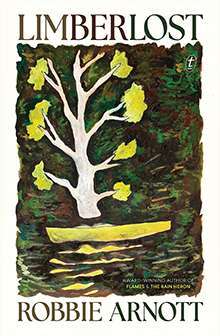 I haven’t read Robbie Arnott’s previous two books, Flames and The Rain Heron, magical fables that have won multiple awards. This novel, Limberlost, is very grounded and realist but no less magical for that.
I haven’t read Robbie Arnott’s previous two books, Flames and The Rain Heron, magical fables that have won multiple awards. This novel, Limberlost, is very grounded and realist but no less magical for that.
Ned is a teenager living in a northern Tasmanian orchard during World War II. His older brothers are away at war and his sister has come home to help their father run the farm. Ned’s mother died when he was very young.
Ned dreams of owning a boat, and shoots rabbits to sell their pelts and save money toward that goal. This partly comes from an experience Ned had when he was five, when his father took the boys out to the mouth of the nearby river to see up close a whale that was reputedly deliberately dangerous to local watercraft.
We follow some key events that shape teenaged Ned’s life: his encounters and relationships with an accidentally trapped quoll, a damaged mare, his best friend, a girl who shows interest in him and, especially, his family. We cut forwards and back in time to find out some key events that inform our understanding of Ned’s life.
Limberlost is essentially about awareness, consciousness and, especially, relationships. For teenaged Ned, his human relationships are less clear and more complicated than his relationships with animals, land, wind and water. His awareness of his place in the world and his family become clearer but no less complicated as he, and we, learn more of his personal history.
The mastery of this novel lies in how Arnott uses language to not just describe these events and relationships but to embody them. It’s both visceral and poetic, or maybe it’s that Arnott finds the poetry in the visceral. Morality, ethics and personal values are imbued in the characters’ natures and their actions. The shape and flavour of the natural and built world and the behaviour of people and animals come alive in Arnott’s words, as they appear to Ned. We’re often granted a deeper understanding than Ned of what’s happening in his world, even as we see it through his eyes.
I found it a very emotional book, even though most of the male characters are of their time and place: stoic, stolid and uncommunicative. We know there’s love between the father and the brothers but they have a hard time showing it directly. The other men in the book are the least perceptive, the most self-interested and the most manipulative characters in the book.
Ned’s relationships with the female characters are a kind of balance to this, keeping his natural openness alive. From the vet who tends to the mare, his visits to his mother’s sailing locale in England, his sister, his wife and right through to his daughters’ attempts to put local history in perspective, it’s the women who keep Ned in balance.
Limberlost touched me deeply, perhaps partly because it is so very Tasmanian. The river didn’t need to be named for me to know exactly which river it is. And yes, I brought to the book my memory of the unmistakably distinctive smell of Huon Pine, and the difference in appearance and behaviour of a sick native cat behind bars compared to a healthy one in the wild. But these are bonuses for me. Arnott’s words will carry anyone into the physical and emotional world of Ned without those references.
It’s hard for me to describe how any book can be so simultaneously grounded in the real, perceptible world and yet so lyrical and poetic. Still young, Robbie Arnott is already a writer of great skill and power. As I said, I haven’t read his previous two books, but I think I’ll be looking them up.
I can’t recommend Limberlost highly enough.